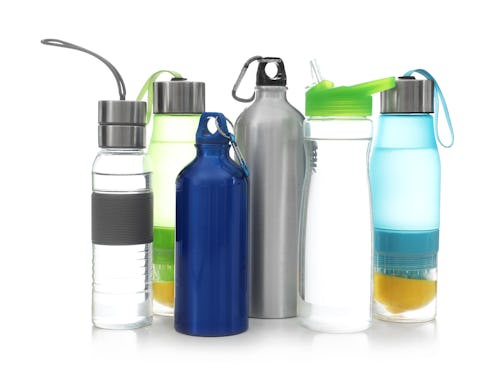
Water bottles come in all shapes and sizes and the type that you buy should depend on your activity and environment. There’s plenty to consider when choosing. Capacity is an obvious factor, but you’ll also want to think about material, shape, mouth width, and whether or not to opt for a bottle with a built-in water filter or purifier.
I have different types of bottles that I take on different adventures. If I’m going on a day bike ride with plenty of water stops en-route, I want a compact bottle that easily slots into my drinks holder. For a multi-day hike, I prefer a hydration pouch with a long, flexible straw that allows me to drink on the go.
Should I go for stainless steel or plastic?
Stainless steel water bottles have thermoregulating properties. They’re perfect for keeping cold drinks cool in hot weather or enjoying a hot coffee in cold conditions. They’re much heavier, though. A good compromise is to carry one small stainless steel bottle on a multi-day adventure, alongside a more capacious, lightweight option.
If you’re opting for a lighter, plastic bottle, make sure that it’s BPA-free. BPA stands for bisphenol A, an industrial chemical that is often used to coat plastic containers for food and drink and has been linked to many cardiovascular problems. Nalgene bottles are made from highly durable, resilient plastic around, and are a popular choice for many hikers.
What capacity should I look for?
If you’re going to be on the go all day with limited places to refill, it’s important to have a high-capacity water bottle. Men are recommended to drink 3.7 liters of fluid a day, and women, 2.7 liters, but when doing intense sport, these figures skyrocket to 5.7 liters and 4.7 liters, respectively. That’s a lot, and most of us would prefer not to hike with almost six liters of water strapped to our backs. If you do need to carry large quantities of water, consider a hydration pouch rather than stainless steel or Nalgene bottles, as this will be lighter. Generally, I make sure that I’ve got three liters of water with me for a day hike, more in particularly arid conditions, and less if I’m confident that I can refill regularly.
What shape of bottle is best?
The shape of your bottle is important for two reasons: ease of refilling and portability. A wide-mouth bottle is easier to refill from sparse water sources (such as a trickling stream) than a narrow-mouth bottle, but they’re not so practical for drinking on the go. A wide-mouth bottle with a nozzle or straw is the best of both worlds.
Bottles with a carry handle or loop to attach to the outside of a backpack are convenient not only for traipsing to and from water sources from your camp, but because they can be clipped to the outside of your pack, freeing up valuable space.
Now that we’ve got the basics out of the way, here are eight of my favorite bottles for every type of backpacking adventure.
Input may receive a portion of sales if you purchase a product through a link in this article. We only include products that have been independently selected by Input's editorial team.
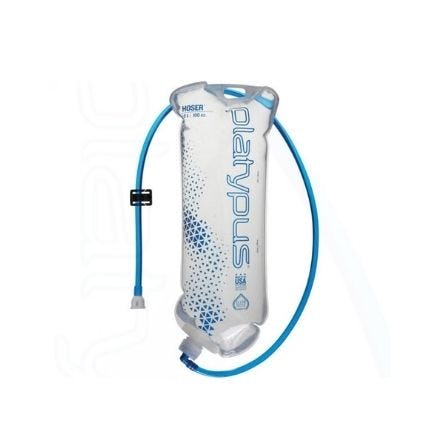
A lightweight and surprisingly strong water pouch, the Platypus Hoser Reservoir is difficult to beat in terms of value. There are several different size options suitable for every adventure, but for thru-hiking I like the 2L option best. The carry loop makes it easy to transport and refill. The drinking tube is prone to leakages, however, particularly if you sit on your backpack.
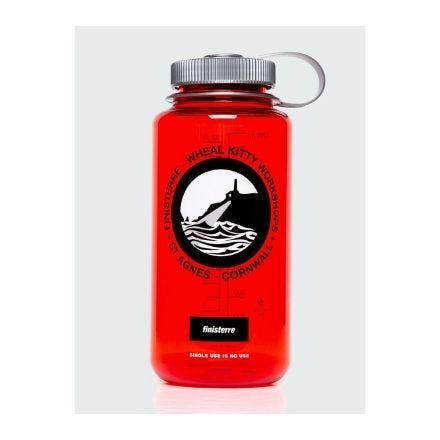
The Finisterre Nalgene Wide Mouth Water Bottle, as the name suggests, has an extra-wide mouth which is good for refilling at even the sparsest water sources. The cap is attached to the bottle to avoid dropping it or losing it in the wind, and the loop on the lid means that it can easily be attached to the outside of a backpack, economizing on all-important pack space. It has a capacity of 1L and has a handy volume indicator marked on the side.
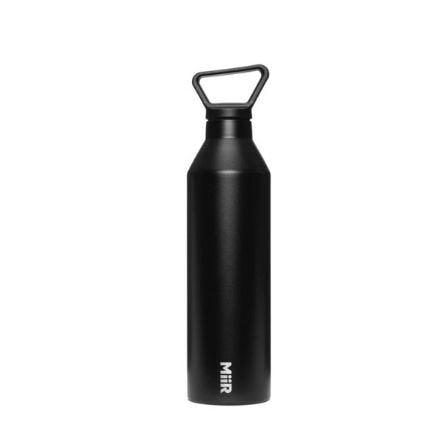
The Miir 23oz Vacuum Insulated Bottle has a sleek design and the hook on the cap is useful for carry or attachment to the outside of a backpack. It’s made from medical-grade stainless steel, which doesn’t transfer any aftertaste, and the double-wall vacuum technology is incredibly efficient at maintaining the temperature of both hot and cold drinks.
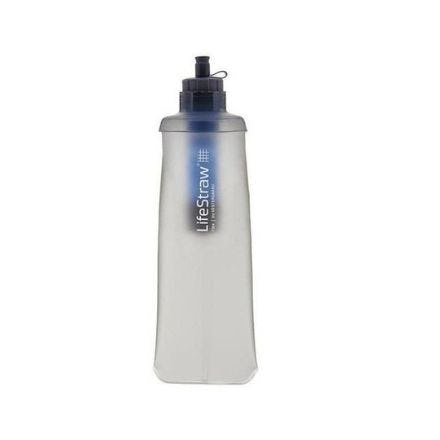
The filter on the LifeStraw Flex with Collapsible Squeeze Bottle offers great protection against bacteria and parasites and can be removed and attached to a bottle. The wide base on this squeeze bottle is less likely to fall over, and the bottle itself weighs just 3.15 ounces, so is extremely lightweight. Read our guide on choosing a water filter or purifier before shopping for a filter bottle.

The CamelBak UnBottle is like the Platypus Hosier Reservoir’s tougher older sibling. It’s fully insulated, so it keeps liquid cool, and has a switch lock in the drinking tube which prevents leaking. The wide access port is more convenient for filling up than most pouch bottles.. It’s very strong: One reviewer even said they’d driven a truck over this pouch without it bursting (not that I’d recommend trying) but you can definitely sit on your backpack without fear of leakage or bursting the pouch.
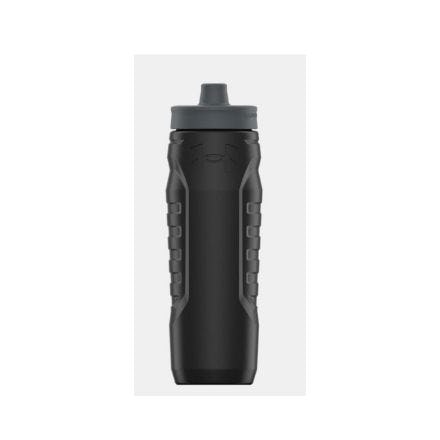
This BPA-free plastic bottle from Under Armour is unpretentious and great value for money. It’s leak-proof and the one-way valve in the nozzle allows for a high water flow, ideal for quenching thirst quickly when exercising. A convenient volume indicator shows you if you’re hydrating enough.
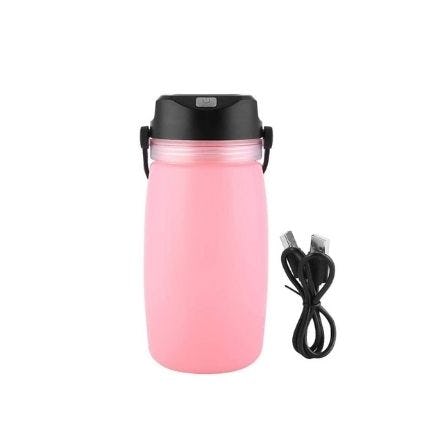
I love multifunctional gadgets, so the VGEBY Solar Water Bottle which quadruples up as a power bank, solar power charger, LED lamp, and water bottle was always going to be a winner. The bottle only has a capacity of 20 ounces, so you won’t want to rely on just this for a backcountry expedition, but it’s a great gadget to have. The light brightness is adjustable using the switch on the cap, too.
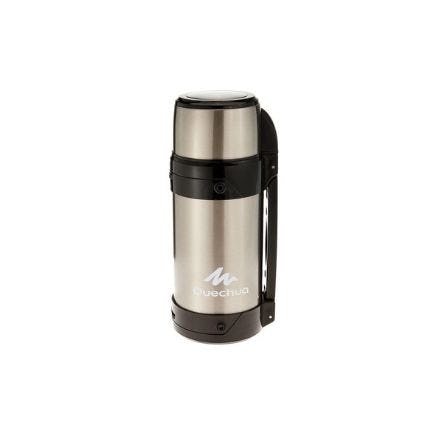
For an insulated bottle, the Quechua Insulated Double Wall Stainless Steel Hiking Bottle is pretty capacious, holding 1.5L. The design is geared towards hot drinks and the vacuum between the two stainless steel walls retains heat really well. The handle is practical for serving drinks at camp and the removable cap doubles as a cup, so it’s an excellent option if you’re traveling in a pair. At 2.2 pounds, it’s fairly heavy and not recommended for ultralight backpacking.







